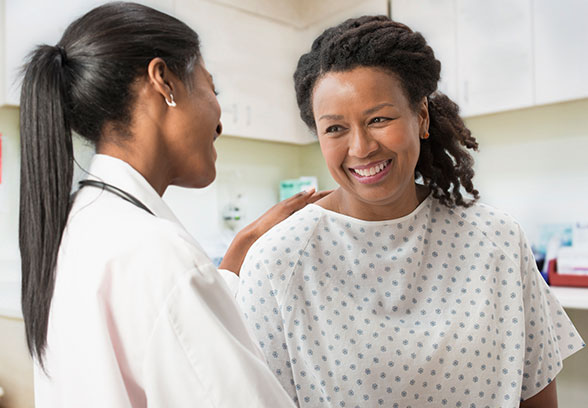

Each year, millions of women head to the gynecologist for pap smears and other tests. While important for detecting cervical and uterine cancers, these visits should also be used to discuss the underlying health and wellness of the female reproductive system with your gynecologist. Unfortunately, you may be too embarrassed to ask your doctor about certain signs and symptoms you are experiencing. Without proper understanding and diagnosis, these issues could potentially lead to serious conditions that affect your physical, reproductive and sexual health. Here are a few questions you should ask your gynecologist even though you may be too embarrassed.
During your exam, your gynecologist will most likely ask if you have noticed any lumps or changes in your breasts. If you are unsure, you are not completing self-exams at home, as recommended. While your doctor will examine each of your breasts during a gynecological exam, self-exams at home should also be a priority.
Recent studies have found self-exams are not capable of preventing cancer, but they can help determine if further testing for breast cancer is necessary. Considering early diagnosis is key to the success of cancer treatments in many patients, finding a small lump or spot during a self-exam at home is beneficial.
Gynecologists recommend examining your breasts 3 to 5 days before your period starts, since your breasts will be less tender and lumpy during this part of your menstrual cycle.
Asking about vaginal discharge may not be appealing, but your gynecologist is a medical professional that is ready and willing to offer assistance for this and other issues. While normal at times, some vaginal discharge may be a sign of an underlying issue that needs to be addressed. Document the type and time of month that you are noticing discharge so you can better explain what you are noticing to your doctor.
Since your vagina is capable of cleansing itself, clear or milky discharge is normal. However, if you are experiencing a heavy volume, color changes, or foul odors in your discharge, you may be suffering a yeast or bacterial infection.
Without consulting your gynecologist, the infections can spread, causing further discomfort and increasing your risk of more involved medical conditions.
Sexual intercourse should be a pleasant experience, so if you are feeling discomfort or pain, it is not normal. Asking your gynecologist about sex may seem embarrassing, but it is important for ruling out any issues affecting your genitalia and reproductive organs.
Stress, anxiety, depression, menopause and even certain medications can prevent or decrease vaginal lubrication. Without sufficient lubrication, intercourse can become painful. Depending on the cause, therapy, hormone replacement or changing your medication can help. Or your doctor can recommend an effective lubricant.
Painful intercourse is a symptom of endometriosis, as well. The condition is caused when tissue from the uterine lining builds up on the outside of the uterus, affecting the entire reproductive system. Other symptoms of endometriosis include the following:
Certain infections of the genitals can also cause sex to be painful. Yeast infections and bacterial vaginosis irritate the vaginal area, causing swelling, inflammation and pain that will only become worse during intercourse. Blisters that develop on the vaginal area due to a herpes infection are uncomfortable when inactive, and they can bleed and become painful during sex.
You should never feel embarrassed to ask your doctor important questions regarding your health and wellness. If you have one of the above concerns or other questions that you are scared to ask, consult a gynecologist from the Alafaya Woods Family Medical Center today.